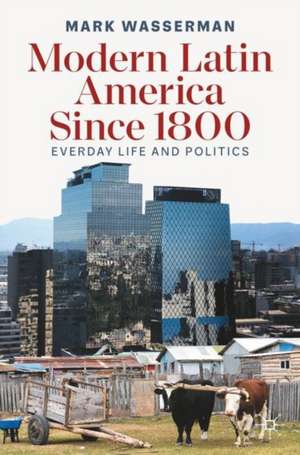Modern Latin America Since 1800: Everyday Life and Politics
Autor Mark Wassermanen Limba Engleză Paperback – 26 aug 2022
Preț: 199.31 lei
Nou
Puncte Express: 299
Preț estimativ în valută:
38.15€ • 41.45$ • 32.07£
38.15€ • 41.45$ • 32.07£
Carte disponibilă
Livrare economică 31 martie-14 aprilie
Livrare express 15-21 martie pentru 30.28 lei
Preluare comenzi: 021 569.72.76
Specificații
ISBN-13: 9783030961848
ISBN-10: 3030961842
Pagini: 276
Ilustrații: XXI, 276 p. 6 illus.
Dimensiuni: 155 x 235 x 21 mm
Greutate: 0.46 kg
Ediția:1st ed. 2022
Editura: Springer International Publishing
Colecția Palgrave Macmillan
Locul publicării:Cham, Switzerland
ISBN-10: 3030961842
Pagini: 276
Ilustrații: XXI, 276 p. 6 illus.
Dimensiuni: 155 x 235 x 21 mm
Greutate: 0.46 kg
Ediția:1st ed. 2022
Editura: Springer International Publishing
Colecția Palgrave Macmillan
Locul publicării:Cham, Switzerland
Cuprins
1. Legacies.- 2. New Nations.- 3. Politics and Economics, 1821-1880.- 4. Everyday Life In An Uncertain Age, 1821-1880.- 5. Economic Modernization, Society, And Politics, 1880-1920.- 6. Between Revolutions: The New Politics of Class and the Economies of Import Substitution.- 7. People and Progress, 1910-1959.- 8. The Search for a Better Way, 1959 to the Present.- 9. Globalization and Everyday Life, 1959 to the Present.- 10. Epilogue.
Notă biografică
Mark Wasserman taught Latin American History at Rutgers, The State University of New Jersey, USA, for forty years. He is the author of four books on Mexico and two bestselling textbooks on Latin American History. He has won several major fellowships and awards for his scholarship.
Textul de pe ultima copertă
This textbook offers an interpretive overview of the history of the Latin American region since the mid-eighteenth century. Its central focus is the struggle of ordinary folks to control their daily lives. It examines the social, economic, and political institutions Latin Americans built and rebuilt, such as families, governments (from village to national levels), churches, political parties, labor unions, schools, and armies, through the lives of the people forged them. It explores the texture of everyday life.
Mark Wasserman taught Latin American History at Rutgers, The State University of New Jersey, USA, for forty years. He is the author of four books on Mexico and two bestselling textbooks on Latin American History. He has won several major fellowships and awards for his scholarship.
Covering the sweep of Latin American history from the perspective of the everyday experiences of the people who madeit, Modern Latin America, tells the story of the forces that shaped the region and how people from various walks of life negotiated the changing dynamics of race, class, gender, political conflict and power to create the societies of today. Integrating current scholarship, the book covers the major themes and events of Latin American history while breaking away from a dry history of states and institutions to provide a window on the dynamics of how people shaped, were impacted by, and lived their history.
Paul Hart, Professor of History and Director of the Center for International Studies, Texas State University, USA
Modern Latin America: Everyday Life and Politics 1800 to the Present is an engaging account that effectively weaves the economic, cultural, social, and political histories of the region. Wasserman has a keen eye, recognizing the challenges that Latin America’s diverse populations have confronted over thecenturies. “Nature’s Way,” one of the special features in each chapter, is a welcome addition at a time when disease and climate change surround us.
Sandra Mendiola García, Associate Professor of History, University of North Texas, USA
Modern Latin America: Everyday Life and Politics 1800 to the Present is an engaging account that effectively weaves the economic, cultural, social, and political histories of the region. Wasserman has a keen eye, recognizing the challenges that Latin America’s diverse populations have confronted over thecenturies. “Nature’s Way,” one of the special features in each chapter, is a welcome addition at a time when disease and climate change surround us.
Sandra Mendiola García, Associate Professor of History, University of North Texas, USA
Caracteristici
Offers a concise survey of Latin America since independence Focused on the lives of ordinary people Places Latin America’s story in a global context
